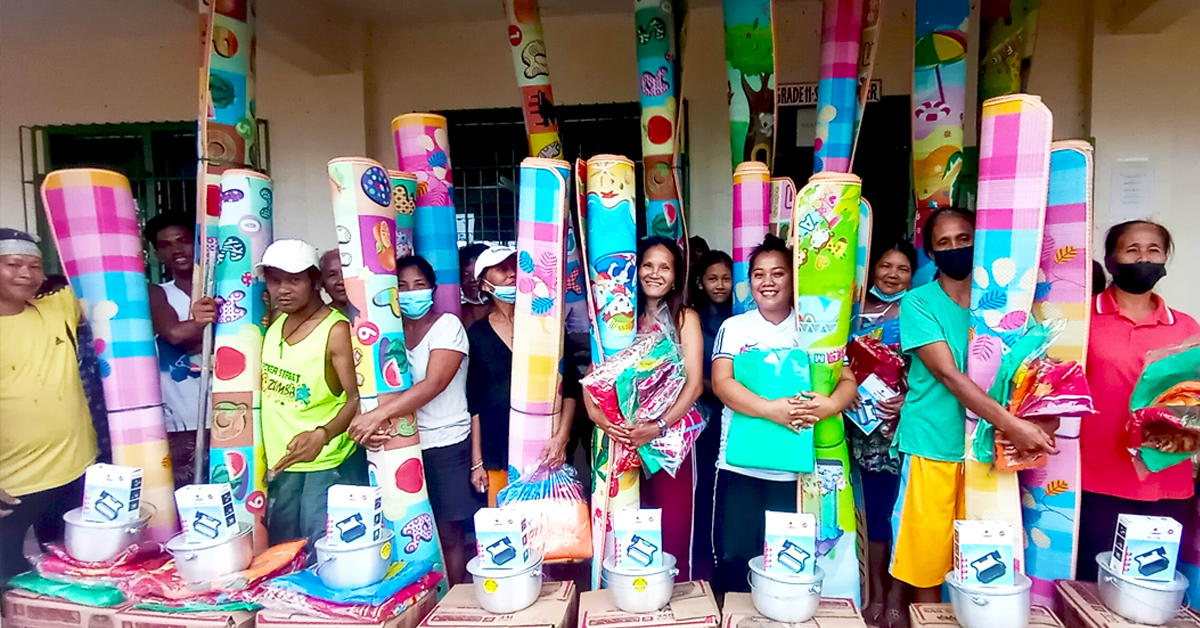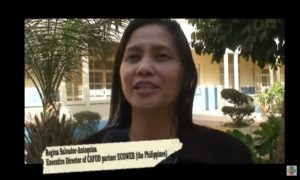The Philippines, among the nations most vulnerable to climate change and recognized to remain the most at-risk country globally for 16 consecutive years, has endured an unprecedented parade of six typhoons in a single month before 2024 closes—Kristine (Trami), Leon (Kong-rey), Marce (Yinxing), Nika (Toraji), Ofel (Usagi), and Pepito (Man-Yi). For the first five storms alone, over 11 million individuals have been affected, with more than 300,000 displaced, 250,000 homes damaged, and extensive losses in agriculture and infrastructure.
The devastating impacts of these storms are compounded by existing vulnerabilities and limited resources.
The Crisis and Community Resilience
Through ECOWEB’s application of the Survivor and Community-Led Response (SCLR) approach, communities have demonstrated remarkable resilience by leading their own recovery and rebuilding efforts. However, the escalating climate crisis is surpassing their capacities. Immediate support and sustained investment in locally-led resilience initiatives are essential to mitigate future disasters.
Our Calls for Support and Action
- Empowering Emergency Aid for Affected Communities: Provide life-saving aid and resources to rebuild resilience in affected areas through local organizations. Support approaches that empower communities to recover using locally-led solutions.
- Commitment to Climate Responsibilities: Global leaders must deliver on climate financing commitments, prioritizing funds for loss and damage, and ensuring transparency and accountability in supporting community-driven adaptation and resilience.
- Scaling Up Nature-Based Solutions (NbS): Investment in ecosystem restoration, such as mangrove reforestation, watershed management, and agroforestry, is critical. NbS mitigate climate risks while enhancing livelihoods and biodiversity.
- Strengthening the Loss and Damage Fund: The Philippine government should advocate for NbS as a priority for funding, ensuring sustainable recovery and resilience for vulnerable communities through inclusive and equitable resource distribution.
- A Turning Point at COP29: COP29 must move from commitments to actionable strategies that address the disproportionate impacts of climate change on countries like the Philippines. A focus on community-driven, nature-based initiatives will ensure justice and resilience for the most vulnerable.
Join the Fight for Climate Justice
The six typhoons in one month underscore the urgent need for decisive action on climate financing and justice. With your support, we can bolster community resilience, advocate for equitable climate policies, and champion sustainable solutions at COP29. Together, let us ensure that no community is left to face the climate crisis alone.
Now is the time to act. Let us work towards a future defined by justice, solidarity, and resilience. For more information or to donate, contact ECOWEB at ecoweb@ecowebph.org or ecoweb2006@gmail.com.
Add logo of website, linkedin, FB page, telephone.

001 Toribia A. Lluch St., Lluch Compound, Camague, Tubod, Iligan City, Philippines
(063) 228 9617
ecowebph@gmail.com
ecowebph.org
Please find the press release shared by our German partner, Help, linked here.
https://www.help-ev.de/presse/pressemitteilung/help-mahnt-humanitaere-kuerzungen-untergraben-klimaversprechen/: Six Typhoons in One Month: A Call for Climate Justice and Clear Climate Financing Mechanisms at COP29 to Support Locally-Led SolutionsEnglish:
Climate Conference COP29
Help warns: Humanitarian cuts undermine climate promises
Bonn, November 18, 2024 – On Sunday, the Philippines experienced its sixth hurricane within a month. Almost one million people are dependent on humanitarian aid, 160 people have died as a result of the storms, hundreds of thousands have been displaced. At the same time, at the COP29 climate conference, the German government promised to push ahead with climate targets more strongly in the future and to support affected countries in dealing with the consequences of climate change. “The recent cuts in the humanitarian sector contradict this,” says Dr. Thorsten Klose-Zuber of the aid organization Help – Hilfe zur Selbsthilfe.
The Philippines is a prime example of how rapidly the climate crisis is affecting countries in the Global South. For the 16th time in a row, the country tops the World Risk Index (WRI) list, making it one of the countries that are particularly vulnerable to natural disasters worldwide. “As a rich industrialized country in the Global North, we have played a major role in causing the climate crisis. In addition to tackling the root causes, we must now support affected people in better coping with the consequences of the climate crisis and strengthening their resilience. For this, aid organizations like us need not less, but more financial resources,” demands Klose-Zuber.
Climate crisis: More funding needed for development cooperation
The important contribution that humanitarian aid makes to climate resilience is shown by aid projects such as those implemented by Help in cooperation with the local aid organization Ecoweb in the Philippines: During Storm Man-Yi on Sunday, for example, vulnerable families were able to escape to a shelter organized by Help and Ecoweb multi-purpose evacuation center in Oras, East Samar. In addition, the aid organizations support indigenous communities in protecting their traditional habitats, which are made even more vulnerable to storms by overexploitation and deforestation, some of which are illegal.
However: “The frequency and intensity of these climate-related disasters is pushing our local resources to the limit,” reports Nanette Antequisa, Managing Director of Ecoweb. “Over 9.6 million people were affected by the effects of the first five storms last month. Storm Trami alone caused agricultural damage amounting to more than 34 million euros in the Bicol region.” The governments of affected districts such as Libon, Albay, are already dependent on the support of locally working aid organizations for reconstruction, and the health care system is overburdened.
“Especially in view of the upcoming new elections and a new federal government, Germany must take its obligations to combat climate change seriously in the future. In order to alleviate acute hardship as a result of the climate crisis and enable adaptation, more funds must be made available for humanitarian aid and development cooperation in the future,” said Klose-Zuber. “It is crucial that we not only talk about solutions at climate conferences like COP29, but also follow them up with action.”
For further information or interview requests, please contact presse@help-ev.de or call +49 (0) 173 7107454.
Help – Help for self-help
Keyword: Philippines
IBAN: DE47 3708 0040 0240 0030 00
Commerzbank Cologne




